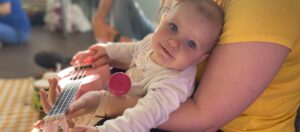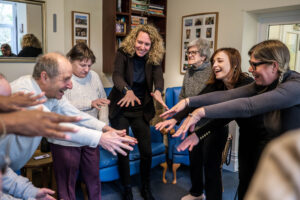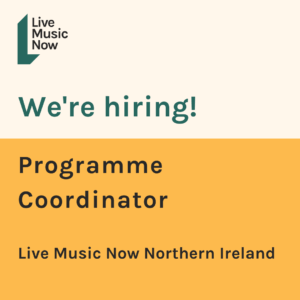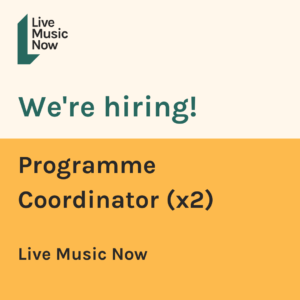
“It reminded me of why I wanted to be a musician in the first place.”
On Wednesday 8 April, at St Margaret's Activity Centre run by Open Age in London, an LMN session took place for people from the local community and residents from the sheltered accommodation above.

This was the first session that soprano Anna Sideris and pianist Jocelyn Freeman had done for LMN, so they were understandably a little nervous.
Their nerves can’t have been calmed by the presence in the audience of two additional guests, Julian Lloyd Webber and Miloš Karadaglić, as well as our Executive Director Evan Dawson. Julian and Miloš are both supporting LMN, and were keen to come and see more of our work in action.

All were warmly welcomed by the St Margaret’s staff and volunteers, as well as the older people, many of whom were keen to share their own musical memories, gathered over lifetimes. Anna and Jocelyn performed with great panache, showing no signs of nerves, moving some to tears, and earning rapturous applause. Anna gave out flowers to audience members at one point, whilst she sang.

After the performance, there was an opportunity for more conversation. And Evan recorded some specific thoughts from Julian, Miloš, Anna, Jocelyn, Carolyn Sellick from St Margaret’s, and the LMN mentor Mae Heydorn.

Evan – Thank you so much for performing for us today. Was this what you were expecting from your first LMN session?
Anna – I enjoyed the fact that this wasn’t a traditional concert setting. I found myself communicating in a completely different way. I really enjoyed that.
Julian – It’s so much more challenging to perform music in a small space like this, where you can see every single face.
Anna – Our LMN mentor (Mae) has talked to us about how to do this, so that it’s possible for people to engage if they want to, but also not to feel that they have to. Whilst I was singing, I was trying to gauge who was comfortable making eye contact, or to sing along.
Miloš – It’s a fine line between encouraging people to participate, and being patronising. This is an easy line to cross, but I felt you handled this so very well today.
Carolyn – For lots of our members, they would never have the opportunity to hear music like this, and to be so close to a performance. It was obviously a really powerful experience for some people.
Evan – Was there anything you found difficult or unexpected today?
Anna – The piano was badly out of tune, and was in fact a whole minor third too low! We had no way of expecting this, and it was a big challenge for me to sing several of the pieces, singing mezzo rather than soprano. But in some ways, this made me focus much more on the whole purpose of this work, which is communicating. So perhaps there was a silver lining to it!
Jocelyn – When I go home and play in Wales, there is sometimes a really lovely feeling of support and appreciation from audiences. I’ve never had that feeling outside Wales, until today! It was a humbling experience, where people seem to be hanging on every note. If people are moved by what we are doing, you can see it immediately. It reminded me of why I wanted to be a musician in the first place. In a traditional concert, you might not make any mistakes, and play just as you want; but not get that type of immediate feedback.
Miloš – Audiences who pay large amounts for tickets expect perfection, but in a small intimate setting like this, people simply appreciate every note. And today, they were eating out of your palms. They would have done anything for you, and that’s why they came, and that’s very heartwarming.
Jocelyn – What’s exciting for me about coming into LMN, is that there’s so much for me to learn. I’ve watched the videos on the website, and it’s been really helpful taking to our mentor Mae – it’s really exciting as a performer to see this huge area of potential for our music.
Julian – One thing you got absolutely right today was the choice of music. If one looks at the list of composers, it included Britten and Poulenc, and you wouldn’t think it was necessarily going to work. But it really did.
Anna – It was really helpful for us to arrive early, and to meet several of the audience members, and to find out which songs had resonance for them. One lady told me afterwards that “A nightingale sang in Berkley Square” was the song she’d danced to at her wedding, and her husband died last year, and it had meant the world to her to hear it again.
Carolyn – This would have made everyone feel very special, to have met you before and after the performance, and to be really involved in the music. A unique occasion. It’s important because some of these people would never hear live music. Someone who adores music, and used to go to concerts regularly, is now living from her pension and can’t possibly afford to go. We could all see how much it meant to her. But also for the whole group, it creates a community feeling, it’s wonderful. Just to get out of the house is rare for some people, particularly if they’re not able to move very easily. Loneliness is a huge challenge, it’s as bad for older people as obesity. And we also want to keep people from sitting on the phone to their GP because that’s the only person who will speak to them. Music is the best way of getting people out of the house, doing something together, and then really interacting with each other.

Miloš – What do you do when it’s a very challenging audience?
Carolyn – We have people here who have early-onset dementia, who would love this sort of experience because it evokes memories, which can be a powerful and uplifting but sometimes upsetting experience for them. But we know who they are, and can usually anticipate anything difficult. We would step in to help, rather than expect musicians to handle this. And it’s very rare for it to happen.
Jocelyn – There’s also control within the repertoire, where you can sense if an audience isn’t comfortable, and perhaps make things shorter, or change the pieces altogether. You might play something that people are familiar with, or that is uplifting, if they seem distant. Or if they’re getting too excited, you might choose something more challenging or gentle. This is a performance skill that you wouldn’t get in another setting.
Miloš – I do this in normal concerts as well sometimes! It can annoy the presenter, but it’s fine if this is what feels natural for the audience.
Julian – Yes, I think classical performances can be too rigid. Sometimes you’re asked to set a programme eighteen months in advance, but you should be able to change as you sense what is happening in the room. It’s a bit like the skill that a DJ has, to judge the mood of the crowd, and choose music accordingly.
Evan – Thank you all very much.






